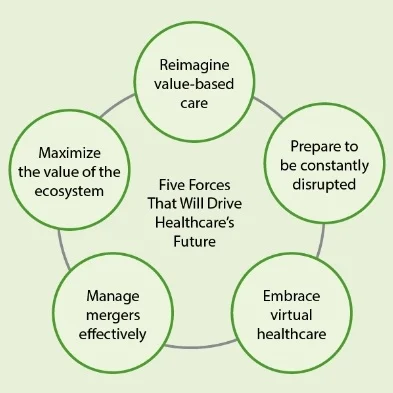In a recent review of its healthcare research, Gallup has identified five main forces that will be defining the U.S. health sector in the future.
You might also like:Containing COVID-19 in EU: Uncoordinated Efforts Don’t Bring Results
In its overview of the U.S. healthcare system, the company stresses that it is “in a state of emergency”. Only about one in five of Americans is "very satisfied" with the quality of medical care, which is exacerbated by high chronic disease burden, insufficient access to care and low quality of the health system. Despite enormous efforts of healthcare leaders to fight the pandemic and some valuable advances, such as the long-awaited digital and technological transformation, the system has been experiencing substantial loss in revenues. By the end of the year it may reach €275 billion ($323 billion).
All these factors combined require that efficient post-COVID recovery strategies are put in place and implemented. Gallup identified five key forces for healthcare organisations’ future development. Namely, healthcare leaders should: reimagine value-based care; prepare to be constantly disrupted; embrace virtual healthcare; manage mergers effectively; and maximise the value of the ecosystem.
Value-based care. While many organisations have already been implementing value-based care models, these efforts need to be supported by enhanced payer-provider collaboration and fine-tuned in each specific case, which means embracing new ways of work and strengthening organisational agility. When dealing with the pandemic impact, cost-cutting might seem tempting, but healthcare leaders should instead focus on longer-term strategic transformation.
Constant disruption.The pandemic has accelerated the growth of new care delivery formats, digital being the most obvious of them. However, the transformation goes beyond only virtual care and includes, for example, the growing involvement of non-healthcare companies, such as Walmart of Amazon. The leaders, Gallup notes, should first of all focus on attracting, retaining and developing top talent. Here, leadership and management role is crucial.
Virtual healthcare. In the last six months the share of Americans who would use telehealth services almost tripled, according to Gallup’s data. This trend is being and should continue to be supported at the governmental level, with some initiatives to strengthen telehealth already being implemented, as well at the organisational level, with hospitals integrating virtual care into their care continuum.
Merger management. While COVID-19 has put some pressure on previously thriving hospital M&A activity, post-pandemic health organisations might need to consolidate to offset the losses incurred. This will require re-evaluation of pre-COVID-19 M&A strategies towards more diverse and innovative ones.
Ecosystem value. The pandemic is causing a change in the healthcare ecosystem. Besides the traditional stakeholders, such as payers and providers, new players are emerging, likeservice vendors that benefit from advancements in analytics, big data and digital transformation. The health leaders should embrace this change and initiate proactive collaboration in this new, more diverse ecosystem. The importance of the collaboration speed has also been highlighted recently (protective gear provision being one prominent example here) and extreme agility is needed for timely actions.
In conclusion, Gallup emphasises the need of collaboration and cross-sectoral synergy, and of prioritising long-term strategic development over shot-term solutions. “Maximizing the collective impact of the combined system will require a unified approach aimed at improving the quality of care and reducing costs,” the company notes, also stressing the importance of enhancing holistic patient wellbeing, i.e. not only physical health but also financial, emotional and societal wellness.
Source and image credit: Gallup


![Tuberculosis Diagnostics: The Promise of [18F]FDT PET Imaging Tuberculosis Diagnostics: The Promise of [18F]FDT PET Imaging](https://res.cloudinary.com/healthmanagement-org/image/upload/c_thumb,f_auto,fl_lossy,h_184,q_90,w_500/v1721132076/cw/00127782_cw_image_wi_88cc5f34b1423cec414436d2748b40ce.webp)







